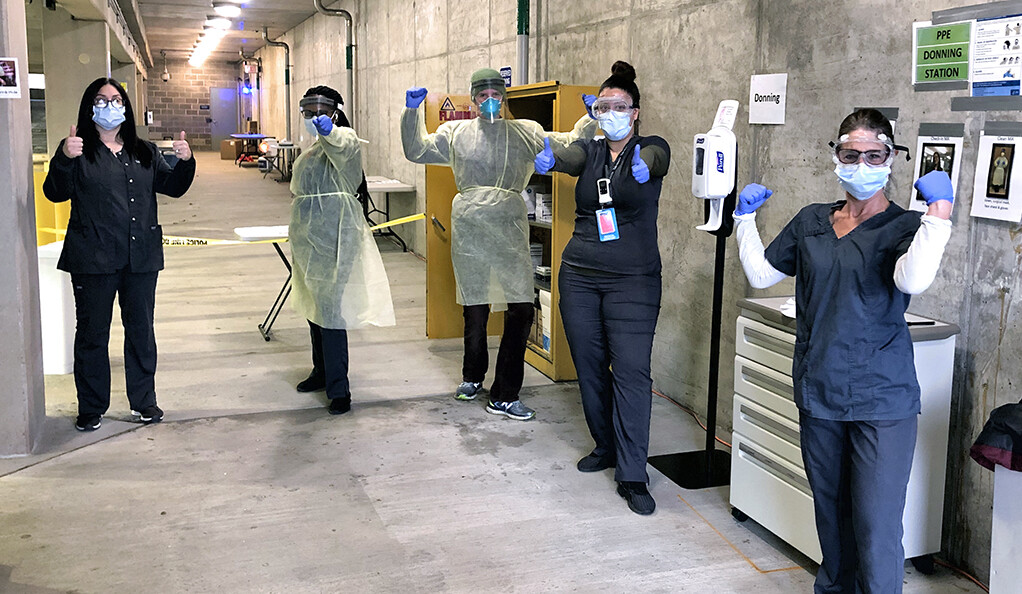Identifying as part of a team helps health care workers’ mental health, Yale study finds
Feelings of team identification help buffer the effects of stress in frontline health care workers, according to a new Yale study.

Yale News
In the midst of the raging coronavirus pandemic, a joint research project published on Oct. 28 between researchers at the Yale School of Medicine and Yale School of Management found that identifying as part of a team has a buffering effect for stress and burnout experienced by health care workers.
A team of professors, pre-doctoral researchers and doctoral candidates studied symptoms of stress and burnout in frontline health care workers during the coronavirus pandemic. According to Rohit Sangal, administrative fellow in emergency medicine, the team sent several anonymous surveys to staff in the Yale Department of Emergency Medicine, asking about their mental health in order to obtain feedback about possible improvements for the department. They found a correlation between high levels of team identification — the feeling of being part of a team — and lower levels of stress or burnout.
“There was an urgent need to discover factors that might buffer frontline caregivers from the unprecedented stressors brought by Covid-19 and reduce burnout given the prolonged nature of the pandemic,” Julia DiBenigno, assistant professor of organizational behavior at the School of Management, wrote in an email to the News.
Amy Wrzesniewski, Michael H. Jordan Professor of management, wrote in an email to the News that the team saw this as an opportunity to support members of the hospital staff who were facing many challenges posed by the pandemic.
Sangal explained that right from the beginning of the pandemic, when protocols were rapidly changing and even experts did not understand everything about the virus, doctors and administrators were concerned for health care workers’ mental health.
“It was pretty clear that this uncertainty was going to be a huge stressor, a source of anxiety for staff,” he said.
Sangal also explained that many of the pandemic’s challenges were already conducive to feelings of isolation and loneliness. Shortages of staff in hospitals meant that frontline workers were moved around frequently, often placing them in environments where they were under extreme stress and had not yet developed relationships with their colleagues.
Knowing this, the team decided to investigate factors that could mitigate the effects of these stressors and help frontline workers overcome mental health challenges more easily.
In the surveys sent to the emergency department staff, the researchers asked questions about health care workers’ feelings and concerns about their experience at the hospital during the pandemic. According to Wrzesniewski, staff who indicated high amounts of team identification showed lower feelings of stress and burnout.
“What is more, this feeling of team identification buffers you from burnout over time,” she wrote.
The researchers also indicated that one of the study’s main goals was to inform other health care systems of what can be done to help their staff members survive the pandemic with less emotional strain.
According to Wrzesniewski, hospital leadership can improve communications, bring teams together when sharing information and structure tasks so that workers feel more connected and united — which would promote team identification.
“Our findings … [offer] a new avenue by which health care leaders can support the resiliency of their workforce since there are many ways hospitals and unit leaders can promote greater team identification among staff,” DiBenigno wrote.
According to DiBenigno, future areas of research include studying how small positive changes in work practices and policies can improve the health care work environment’s morale in ways that will remain after the COVID-19 pandemic.
“Our next steps are to continue being of service to frontline caregiver units facing the Covid-19 crisis by using our ongoing research engagement through surveys and interviews to identify new ways of promoting resiliency among staff, supporting leaders, and driving positive change in work practices,” DiBenigno wrote.
Tools for health care professionals coping with stressors are available at the Centers for Disease Control and Prevention’s website.
Beatriz Horta | beatriz.horta@yale.edu







